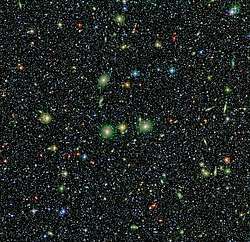Norma Cluster
The Norma Cluster (ACO 3627 or Abell 3627) is a rich cluster of galaxies located near the center of the Great Attractor; it is about 68 Mpc (222 Mly) distant.[4][5] Although it is both nearby and bright, it is difficult to observe because it is located in the Zone of Avoidance, a region near the plane of the Milky Way. Consequently, the cluster is severely obscured by interstellar dust at optical wavelengths. Its mass is estimated to be on the order of 1015 solar masses.[3]
| Norma Cluster | |
|---|---|
 Centre of Norma Cluster with Milky Way stars in the foreground. Giant galaxies ESO 137-8 and ESO 137-6 are visible to the left. | |
| Observation data (Epoch J2000) | |
| Constellation(s) | Norma, Triangulum Australe |
| Right ascension | 16h 15m 32.8s[1] |
| Declination | −60° 54′ 30″[1] |
| Richness class | 1[2] |
| Bautz–Morgan classification | I [2] |
| Redshift | 0.01570 (4 707 km/s)[1] |
| Distance (co-moving) | 67.8 Mpc (221.1 Mly) h−1 0.705 [1] |
| Binding mass | 1015[3] M☉ |
| X-ray flux | 10 mCrab[3] |
| Other designations | |
| Abell 3627, ACO 3627[1] | |
ESO 137-001, an example of a jellyfish galaxy, is located in Abell 3627.[6]
See also
- List of galaxy clusters
- Coma Cluster
- Eridanus Cluster
- Fornax Cluster
- Virgo Cluster
- X-ray astronomy
References
- "Norma Cluster". NASA/IPAC Extragalactic Database (NED). Retrieved 2006-10-22.
- Abell, George O.; Corwin, Harold G., Jr.; Olowin, Ronald P. (May 1989). "A catalog of rich clusters of galaxies". Astrophysical Journal Supplement Series. 70 (May 1989): 1–138. Bibcode:1989ApJS...70....1A. doi:10.1086/191333. ISSN 0067-0049.
- H. Boehringer et al., Astrophys. J. 467, 168 (1996)., R. C. Kraan-Korteweg et al., Nature 379, 519 (1996).
- R. C. Kraan-Korteweg, in Lecture Notes in Physics 556, edited by D. Pageand J.G. Hirsch, p. 301 (Springer, Berlin, 2000).
- "Abell 3627". NASA/IPAC Extragalactic Database (NED). Retrieved 2012-02-25.
- "New Hubble image of spiral galaxy ESO 137-001". www.spacetelescope.org.
External links
- ESO Press Photos 46a-j/99
- The Norma Cluster on WikiSky: DSS2, SDSS, GALEX, IRAS, Hydrogen α, X-Ray, Astrophoto, Sky Map, Articles and images
- Galaxy Cluster Has Two 'Tails' to Tell. NASA Image of the Day, January 22, 2010.
This article is issued from Wikipedia. The text is licensed under Creative Commons - Attribution - Sharealike. Additional terms may apply for the media files.